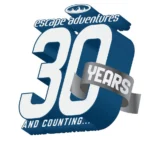by CHRISTINA PALASSIO · Originally published in The Globe and Mail October 15, 2019
/arc-anglerfish-tgam-prod-tgam.s3.amazonaws.com/public/6OWPODW4XZBUXBZZC43SFVVEZ4.jpg)
A visit to the Grand Canyon that doesn’t involve elbowing your way through crowds to get a view, or booking a year in advance to get a room? Yes, it’s possible. Just shift your sights to the North Rim.
Only 10 per cent of the six million tourists who visit the Grand Canyon each year make it to the North Rim. There are some good reasons: The season there is shorter, the temperature’s cooler and the amenities are fewer and farther between. But if you’re okay with roughing it a little, the trade-off pays off in spades. You’ll find stunning views you can’t get on the South Rim, beautiful campsites and lodges, and the kind of quiet and solitude you’d expect only in the backwoods.
Here are four ways you can get up close and personal with the Grand Canyon’s 70 million years of history along its less-travelled North Rim.
BY MOUNTAIN BIKE
Imagine pedalling through a fragrant forest of ponderosa pine, aspen and juniper, and popping out right on the edge of the Grand Canyon for your private viewing. That’s what’s waiting on the Rainbow Rim Trail.
The remote, 36-kilometre Rainbow Rim Trail is the only singletrack trail on the rim of the Grand Canyon that’s open to bikes. The trail cuts through the 1.6-million-acre Kaibab National Forest, landing on the rim at five different overlooks: Parissawampitts, Fence, Locust, North Timp and Timp. Each provides colossal views of some of the Canyon’s unique geological features, including the Tapeats Amphitheatre, the Powell Plateau, Steamboat Mountain and the Great Thumb Mesa. While you gaze out at the Canyon, you can ponder the phenomenon known as the Great Unconformity, which describes the occurrence of 250-million-year-old rock strata and 1.2-billion-year-old rocks lying side-by-side. Where the missing slice went, no one knows. Something to ponder as you continue on your journey.
Most cyclists bikepack the trail as an out-and-back trip, or set up camp at Locust Point and do two out-and-back trips from there. There are no services along the trail, so plan to bring all the water, food and supplies you’ll need for the trip. And don’t rush. Brewing a coffee while the sun rises over the Canyon is something you’ll want to do more than once.
If you prefer a group experience, book a trip with one of several outfitters that run tours of the Rainbow Rim and nearby trails. Escape Adventures offers a four-day mountain biking and camping excursion that will take you along the Rainbow Rim Trail and a section of the Arizona Trail – not only do they provide bikes and guides, they’ll also make sure you’re fed and hydrated the whole way.
/arc-anglerfish-tgam-prod-tgam.s3.amazonaws.com/public/4LRRTSARL5HHXGYKYU6T5WS3BE.JPG)
BY FOOT
Slow it down even more and tackle the North Rim by foot. The historic Grand Canyon Lodge on Highway 67 makes a great home base for a week’s worth of hikes. Before you start, give yourself time to acclimate to the elevation, which, at around 2,400 metres, is about 300 metres higher than the South Rim. That extra height provides dramatic views, but prepare for them to leave you breathless in more than one way.
Start by stretching your legs on the short, paved Bright Angel Point Trail, which picks up right behind the lodge and offers views of the Canyon and the San Francisco peaks. Try it at sunrise or sunset for best results. Next, head out to the Cape Final or Widforss trails, easy to moderate hikes that range from six to 14 kilometres return and wind through forest to stunning lookout points.
The adventurous set can tackle the North Kaibab Trail, a 45-kilometre trail that descends to the base of the Canyon. The day-trip version takes you 13 kilometres to Roaring Springs and back. Along the way, you’ll descend switchbacks, glimpse the majestic Bright Angel Canyon, and pass through Redwall Limestone tunnels and over a wooden suspension bridge.
To really get to the bottom of your Canyon obsession, try a multiday rim-to-rim hike. Completing this hike requires a high level of physical fitness and advance accommodation booking. Most people camp or stay at the almost hundred-year-old Phantom Ranch, whose wood-and-boulder cabins are located at the base of the canyon, right next to the Colorado River. Want to be guided? Several outfitters, including Wildland Trekking, offer three- or four-day hiking tours.
BY MULE
Mules have been transporting humans into the Canyon since the late 1800s. Join the parade and sign up for one of Canyon Trail Rides’ excursions: Choose from a one-hour ride along the rim or a three-hour ride descent into the Canyon to the Supai Tunnel.
BY CAR
Start your trip along the North Rim Scenic Drive at the North Rim Visitor Centre. First stop, the General Store, for doughnuts and all your North Rim souvenir needs. Then head out on Arizona Scenic Byway 67 for a heart-expanding drive to four Canyon overlooks. At Saddle Mountain, a short, steep hike will bring you to a couple of quiet lookouts. Point Imperial is the highest overlook in the park at 2,683 metres; from here you can see the iconic Mount Hayden (keep your eyes peeled for rock climbers scaling the sandstone peak), the Vermilion Cliffs and Marble Canyon. Cape Royal provides an almost panoramic view of the Canyon and the Colorado River. If you’re feeling adventurous, drive out to Point Sublime for another rare perspective on the Canyon – but note that you’ll need a high-clearance vehicle with four-wheel-drive to get there.
If you’re doing the North Rim by car, best to fly into Flagstaff, Ariz., and rent a car at the airport. The drive to the North Rim Visitor Centre is just short of four hours non-stop, but you may want to stop at Marble Canyon for some slot canyon explorations on the way. Or consider a drive into Utah to explore Zion National Park and the Kolob Canyon.
/arc-anglerfish-tgam-prod-tgam.s3.amazonaws.com/public/PQ24LW6JNVA4JEEDDY2G6ERFEQ.jpg)




 Since 1992, we at Escape Adventures have been blessed to shape and lead adventure travel vacations through some of the most awe-inspiring natural destinations in the world. Each successive season, our passion for adventure grows through memorable moments with our guests. Fresh air, faith, fitness and friends are the building blocks for our ventures, the treasured experiences that keep us moving forward. For those of you who have trekked and traveled with us over the past quarter century, Heather and I express our sincerest gratitude. The memories are priceless.
Since 1992, we at Escape Adventures have been blessed to shape and lead adventure travel vacations through some of the most awe-inspiring natural destinations in the world. Each successive season, our passion for adventure grows through memorable moments with our guests. Fresh air, faith, fitness and friends are the building blocks for our ventures, the treasured experiences that keep us moving forward. For those of you who have trekked and traveled with us over the past quarter century, Heather and I express our sincerest gratitude. The memories are priceless.